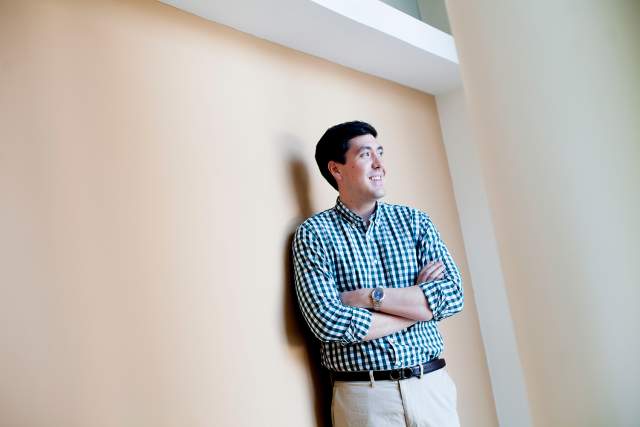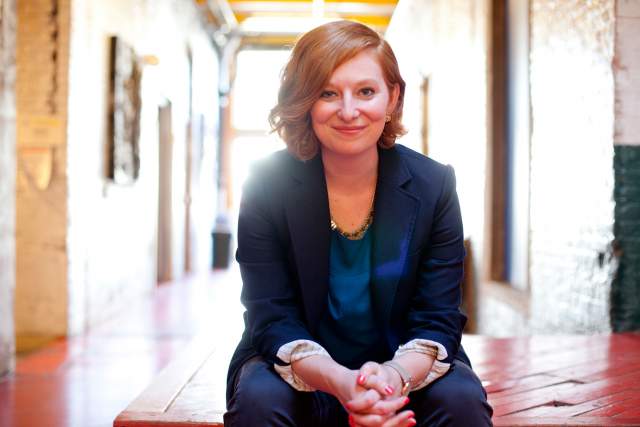A Car Care Business, Started at Tuck
T’17s Russ Walker and Edward Warren are the founders of Zippity, a convenient car care startup launched in Hanover.
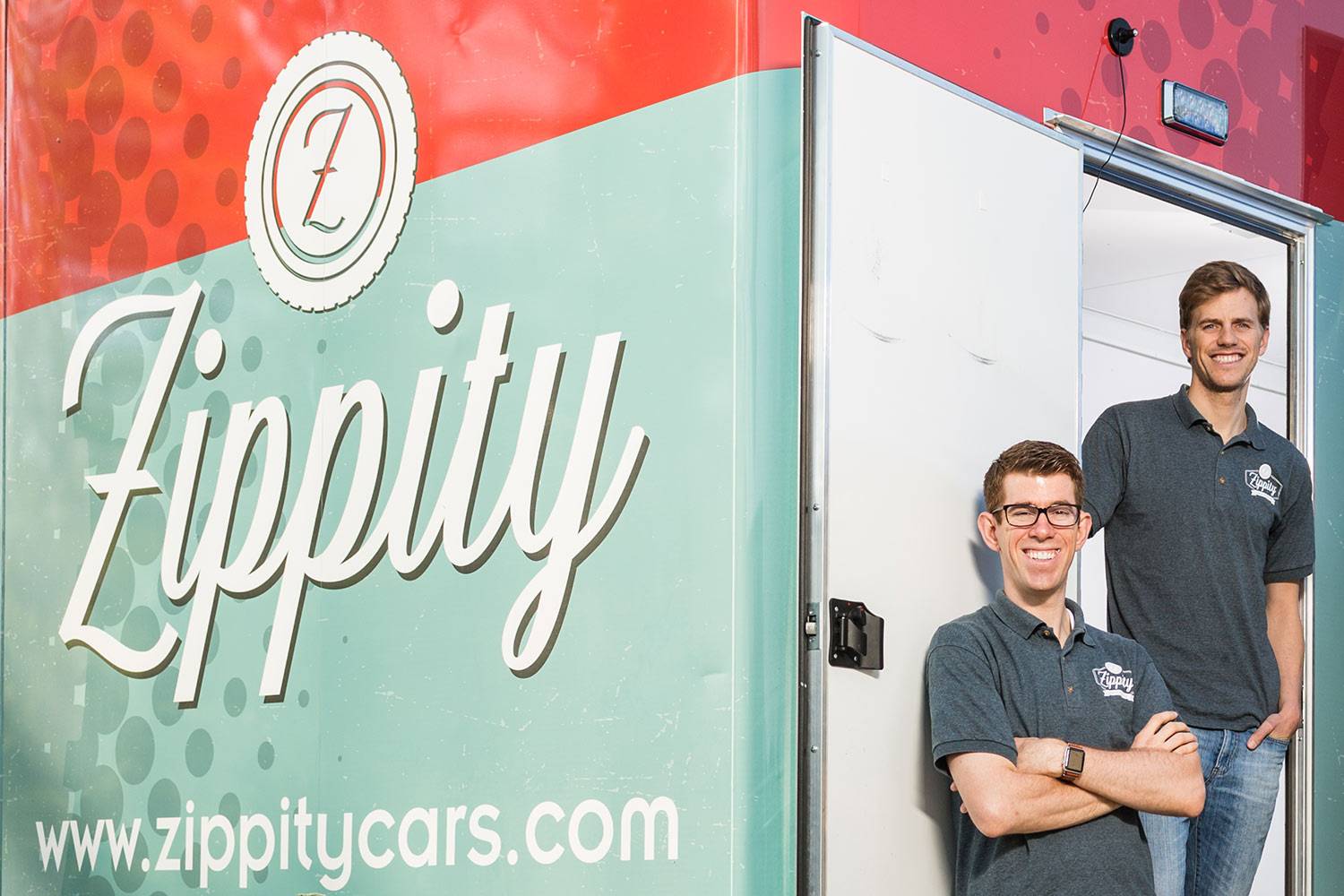
Zippity partners with large employers to provide on-site car maintenance services for employees.
At the beginning of his first year at Tuck, Nick McGowan T’17 was experiencing a mild case of déjà vu.
His new friend and classmate, Ed Warren, was talking to him about an idea for a business: a car care company that takes the hassle and frustration out of maintaining an automobile. Just a few weeks before, McGowan had heard a similar pitch from another classmate, Russ Walker, during a pre-term Technology Trek organized by the Career Development Office. McGowan connected the two entrepreneurs, and a little while later they met for breakfast at Lou’s in Hanover. Walker and Warren learned they had compatible values and a shared desire to use technology to solve a tangible problem, and they decided to work on a startup together. About a year and a half later they officially launched Zippity, an enterprise that partners with large employers to provide on-site car maintenance services for employees via a mobile garage and an automated scheduling platform.
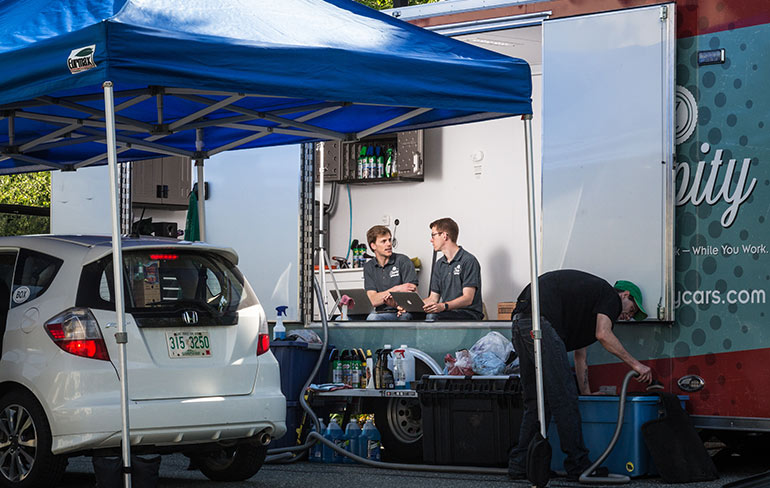
The internet-connected trailer, which was stationed on Tuck Drive for several weeks, holds service equipment and has room for working on one car with a side tent that functions as a second bay.
In the time between the idea-creation and the launch of the business, Walker and Warren received support from Tuck and Dartmouth, and drew on the Tuck network for inspiration and research.
First, in October of 2015, they applied for a Founders Grant from the Dartmouth Entrepreneurial Network (DEN). The Founders Grant is part of DEN’s seed funding portfolio and is available to enrolled full-time undergraduate and graduate Dartmouth students, Dartmouth faculty, and Dartmouth staff who are either the founder or one of the co-founders of a venture. Based on the strength of their online application and pitch deck, Walker and Warren received the maximum amount of grant money available: $5,000.
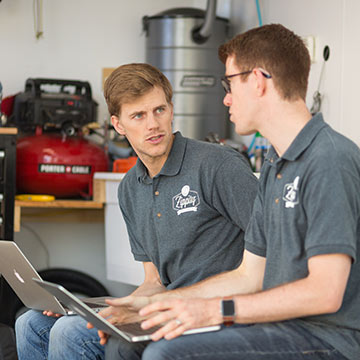
Walker and Warren share a desire to use technology to solve tangible problems.
They stowed the funds away for the rest of the fall term and decided to work on their business for their First-Year Project (FYP), in the spring. During the FYP, the duo and their student team interviewed potential customers to understand the challenges of car maintenance; they tested advertising by running a number of Facebook ads that were worded slightly differently; and they offered preliminary car service (wiper blade changes and interior cleaning) to gauge demand. In just 24 hours, people in the local community had ordered 125 services, far more than Walker and Warren could provide at that early stage.
At the beginning of the founders’ second year at Tuck, Zippity began its pilot program, setting up shop for one day per week in the parking lots of Adimab (a biotech firm in Lebanon, NH co-founded by Thayer professor Tillman Gerngross) and the River Valley Club, a local fitness center. The pilot was an important part of the learning process. “We determined they were a bit small for us,” Walker says of the businesses. “We’re now targeting employers that have 200 or more employees. Otherwise, it’s hard to make a service day full.”
Walker and Warren refined their operations over the winter. They opened for business on March 8 with two full-time employees performing oil changes, interior and exterior cleans, wiper blade replacements, and tire inspections. There are two crucial components to the business: a trailer servicing system and a back-end scheduling platform. The internet-connected trailer, which was stationed on Tuck Drive for a few weeks when Zippity launched, holds the service equipment and has room for working on one car. There’s also a side tent that functions as a second bay. The scheduling system, custom-built by a co-founder in Boston, opens up service days based on momentum and demand, and interacts with customers, technicians, and the service-day dispatcher who manages logistics remotely.
Warren credits Tuck with helping Zippity get this far. “I feel very supported by faculty and staff,” he says. “We had great mentorship from Trip Davis D’90 (the entrepreneur-in-residence at the Dartmouth Office of Entrepreneurship and Technology Transfer), professor Steve Kahl D’91, and Daniella Reichstetter T’07 (the executive director of entrepreneurship at the Center for Private Equity and Entrepreneurship). Zippity needed space to get going, and if Tuck had not helped turn red lights into green lights, we probably wouldn’t have gotten off the ground. Steve Lubrano T’87 (the executive director of infrastructure and operations at Tuck), has taken it upon himself to see that we succeed. It’s been huge.”
We want to deliver small business owners a trailer and a plug-and-play system that solves car care problems in their local area.
Zippity now works with two employers in the Upper Valley: Dartmouth College (including Tuck, Thayer and Geisel), and Hypertherm, with many more on the way. The plan is to expand to the Boston area and then scale up across the country—potentially as a franchise. “We want to deliver small business owners a trailer and a plug-and-play system that solves car care problems in their local area,” Warren says. “We think that Boston is the first place to really build this out and show that it works at scale.”
